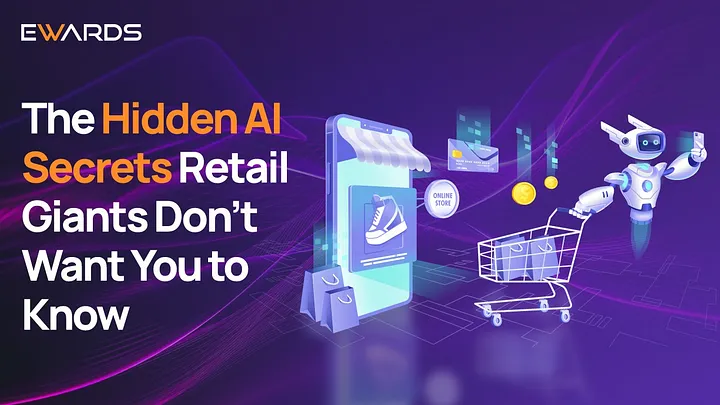
In the fast-changing world of retail, artificial intelligence (AI) is transforming the industry. Big retail companies use AI in powerful ways, but they often keep their best strategies and technologies a secret. This article will reveal the hidden AI secrets that these retail giants don’t want you to know. You’ll learn how to use AI to grow your retail business, become more flexible, and work more efficiently. Get ready to discover how AI can give you an edge over the competition.
AI: A catalyst for retail transformation
Retail is undergoing a change driven by artificial intelligence, which enables companies to use data in ways that were previously unheard of. AI’s applications are vast and varied, from personalized customer experiences to optimized supply chain management. The ability to process and analyze large volumes of data swiftly and accurately is a game-changer for the retail sector.
Enhancing the customer experience
One of AI’s most significant impacts in retail is improving the customer experience. AI-driven personalization engines analyze customer data to provide tailored product recommendations, personalized marketing messages, and dynamic pricing. This level of customization increases customer satisfaction and loyalty.
Example: Personalized shopping experience
Consider a high-end retail brand that uses AI to create virtual shopping assistants for its customers. These assistants analyze a customer’s past purchases, preferences, and even social media activity to provide personalized shopping advice and product recommendations in real time.
Optimizing supply chain management
AI plays a pivotal role in streamlining supply chain operations. Predictive analytics, powered by AI, forecast demand more accurately, reducing overstock and stockouts. AI also improves inventory management by anticipating product reordering needs and pinpointing the most effective shipping routes.
Example: Predictive maintenance for retail equipment
A retail chain uses AI to monitor the health of its in-store equipment, such as refrigerators and HVAC systems. Predictive maintenance algorithms analyze sensor data to predict when a piece of equipment is likely to fail, allowing for proactive maintenance and reducing downtime.
Boosting marketing effectiveness
AI revolutionizes retail marketing by enabling more precise targeting and measurement of campaigns. Machine learning algorithms analyze customer data to identify patterns and predict future behaviours, allowing marketers to design highly targeted campaigns that resonate with their audience.
Example: AI-Driven Visual Search
A fashion retailer integrates AI-powered visual search into its online store. Customers can upload a photo of an outfit they like, and the AI will find similar items available for purchase. This not only enhances the shopping experience but also drives sales by meeting customer preferences more accurately.
Enhancing operational efficiency
AI can automate various operational tasks, freeing up human resources for more strategic activities. For example, AI-powered chatbots handle customer inquiries 24/7, providing instant support and freeing up customer service representatives to tackle more complex issues.
Example: Automated Product Categorization
An online marketplace uses AI to automatically categorize new products as they are added to the inventory. The AI analyzes product descriptions, images, and other metadata to assign accurate categories, improving search functionality and the overall customer shopping experience.
The Flexibility and Mobilization of Resources
AI drives growth, increases flexibility, and increases resource mobilization within retail businesses. By automating routine tasks and providing actionable insights, AI enables businesses to allocate resources more effectively and adapt swiftly to market changes.
Dynamic Pricing
In real-time, AI algorithms can analyze market conditions, competitor pricing, and customer demand to adjust prices dynamically. This flexibility allows retailers to remain competitive and maximize profits.
Example: Geo-Targeted Dynamic Pricing
A global retail chain uses AI to implement dynamic pricing based on geographic location. The AI system adjusts prices based on local market conditions, competitor pricing, and regional demand, optimizing revenue and competitiveness in diverse markets.
Workforce Optimization
AI helps optimize workforce management by predicting staffing needs based on sales forecasts and foot traffic patterns. This ensures that retail stores are adequately staffed during peak hours, improving customer service and operational efficiency.
Example: AI-powered employee training
A retail company uses AI to develop personalized training programs for its employees. The AI analyzes each employee’s performance data and learning style to create customized training modules that enhance their skills and productivity.
Conclusion
The integration of AI in retail is not just a trend; it is a transformative force that is reshaping the industry. From enhancing the customer experience and optimizing supply chain management to boosting marketing effectiveness and operational efficiency, AI offers a myriad of benefits that drive growth and flexibility. Retail businesses that embrace AI will not only gain a competitive edge but also be well-equipped to navigate the complexities of the modern retail landscape.
By understanding and implementing AI-driven strategies, retail businesses can achieve unprecedented growth, flexibility, and resource mobilization, positioning themselves for long-term success in an ever-evolving market.